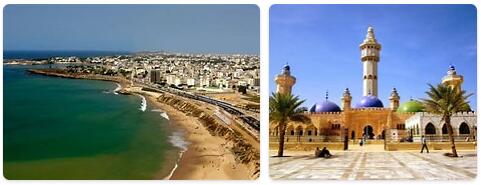Most trips to Senegal are made without special problems and the country is one of the more stable in West Africa. The greatest risk is related to poor infrastructure and transport safety.
Safety
The greatest danger to visitors is related to traffic accidents, theft and profit crime and a poor health service. Travelers are encouraged to take reasonable precautions and limit traffic at night.
The Casamance conflict in the south of the country remains unsolved. It is encouraged to keep up to date on developments in the area in terms of. planned trips or stays. There have been cases of kidnapping in the border areas against Mali and Mauritania.
There are several known cases of fraud and extortion of foreign nationals in Senegal.
There is no particular danger to natural disasters in Senegal, but some areas are regularly hit by floods and droughts.
Norwegian citizens residing in or planning a trip to Senegal are encouraged to register their travel via reiseregistrering.no/.

Entry
It is noted that the entry rules for Norwegians are changing, and it is recommended to contact the nearest Senegalese embassy on the matter. The Foreign Service is not responsible for changes in entry regulations or visa requirements at short notice. It is the responsibility of the traveler to ensure that travel documents are valid for entry and to familiarize themselves with the current entry rules for each country.
Information can be obtained from the nearest Senegalese consulate (Denmark/ Sweden) or embassy (The Hague, Brussels), possibly from consulates/embassies in surrounding countries. Travelers are responsible for having a passport that is valid for six months after scheduled departure.
Travelers must be able to present a valid vaccination card (yellow fever vaccine) upon entry.
Health
The standard of local hospitals is generally poor, but there are some private and local clinics that are designed for easier treatments. Travel insurance should cover transportation for medical needs.
Senegal is a malaria area and preventative medication is recommended. In addition, it is recommended to use mosquito repellent and mosquito nets. Everyone should be vaccinated against jaundice, diphtheria, tetanus, whooping cough and poliomyelitis. You may be asked to present a valid vaccination card upon arrival and if you come from places where yellow fever is prevalent.
Practical information
Norway is represented with an honorary consulate in Dakar and shares a consul with Sweden. Responsible Norwegian embassy for Senegal is the embassy in Accra (Ghana). There is limited capacity for monitoring Norwegian nationals in the country. The UD’s 24-hour operational center in Oslo can be contacted on tel. +47 23 95 00 00 in case of emergency. According to allcitycodes, Senegal area code is +221.
The official name is Republic of Senegal and the capital is Dakar. French is the official language.
There are ATMs in Dakar, around the tourist spots and at the airport. Most hotels accept credit card payments.
Senegal is mainly a Muslim country (94 percent), but with elements of Christianity and local faiths. Local traditions and customs should be respected, especially during the fasting month of Ramadan. Avoid taking pictures of people without permission. Photographic equipment must not be used near military facilities.